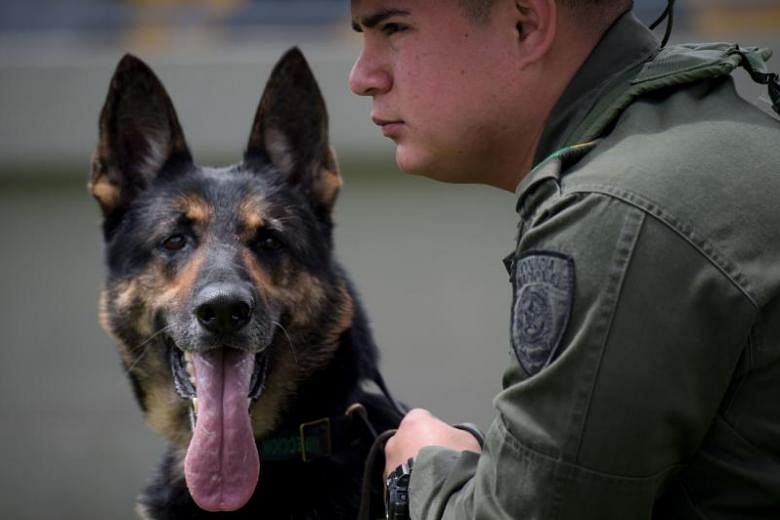WASHINGTON (WASHINGTON POST) - Like a cocaine-fuelled Homeric epic, Colombia's long tragic battle with the drug cartels has produced countless heroes and villains.
But one figure cutting across the country's current narco battlefield, a name drawing praise and hate alike, is actually a six-year-old German Shepard you can find trotting through the country's airports.
Sombra - "Shadow" in English - is a drug detection dog with the Colombian National Police. Over the last few years, her radar nose has led to more than 200 arrests and the seizure of at least 9 tonnes of illicit drugs.
That success has turned the dog into something of a folk hero in a country consumed by ongoing bloodshed piled on top of a long legacy of drug violence. The Colombian press has even dubbed Sombra "the terror" of drug traffickers.
But Sombra is so good at her job that Colombia's dominant drug crew is retaliating. They've put a price on the dog's head.
According to Colombia's RCN Radio, police intelligence recently learned about the bounty set by the Urabeños, also known as the "Gulf Clan".
Reports vary on the price tag for killing the dog, between 20 and 200 million Colombian pesos - or about US$7,000 and US$70,000. But the threat is serious enough for the National Police to take extra precautions for Sombra's security.
"The fact they want to hurt Sombra and offer such a high reward for her capture or death shows the impact she's had on their profits," a police spokesperson told the Telegraph.
Sombra came to Colombian law enforcement from a kennel in Antioquia, the region of the country that's home to Medellín, the springboard for Colombia's fearsome cartels of the 1980s and 1990s.
Outfitted in a neon-yellow vest, the dog is tasked with thrusting her trained snout into luggage and packages in Colombia's ports and airports along the country's Gulf Coast.
RCN Radio reports her first major bust was in March 2016, when Sombra nosed her way towards a container of banana boxes that secretly held 2,958kg of cocaine hydrochloride. The shipment was on its way to Belgium.
In May 2017, Sombra discovered another shipment heading to Belgium containing 1.1 tonnes of cocaine. Last June she led police to an even larger find - 5.3 tonnes of cocaine, the BBC reported. Later she discovered 4 more tonnes secreted in an auto parts shipment.
In total, her busts have resulted in 245 arrests, Colonel Carlos Fernando Villareal told RCN Radio. Sombra's efforts for law enforcement have twice earned her the Wilson Quintero medal, an honour awarded for critical contributions to the fight against drug trafficking.
Sombra's accomplishments have made her the cuddly face of Colombia's anti-drug effort.
She's been featured on local television. In airports, the dog is asked to pose for selfies with admirers. And the narcotics police regularly post about her accomplishments on Twitter.
This month, police used Sombra to specifically call out the Urabeños's alleged notorious chief, a former paramilitary guerrilla turned drug trafficker named Dairo Antonio Úsuga. In Colombia, he's known as "Otoniel".
"(I)n the last three years she's become the torment of 'Otoniel,'" a recent tweet stated.
The dog can handle the high profile, her owners have said.
"Sombra is a very friendly, calm canine, and for that reason, she has no problem approaching children or people who want to say hello to her," Oscar Favian Solarte, head of the anti-narcotics division, told El Tiempo.
"She's playful, and in fact that is part of the development of her job. Not only to look for caches of illicit drugs but also, after her work is done, to de-stress, so to speak."
But all that attention has put Sombra in the Urabeños's crosshairs.
Originally a paramilitary outfit, one of the many armed groups trading bullets in Colombia's long national struggle, the Urabeños are now the country's largest criminal organisation and control much of the drug trade, according to InSight Crime.
Consolidating power by taking on all rivals, the group's power base spreads along Colombia's northwest coast. According to InSight, the group pulls money from various criminal activities, such as extortion, illegal mining, and smuggling.
Otoniel remains at large and in control of the vast organisation.
In response to the bounty on Sombra's life, General Jorge Nieto, head of the national police, has ordered the dog transferred to Bogotá's El Dorado International Airport, outside of the Urabeños's territory on the coast. According to the Telegraph, additional officers will now accompany Sombra on her rounds.



